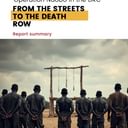
In the latest episode of our Discussions with DPIC podcast, Keelah Williams (pictured), assistant professor of psychology at Hamilton College in New York, joins DPIC executive director Robert Dunham to discuss the implications of new research on the death penalty and resource scarcity.
“Resource scarcity” is a concept from evolutionary psychology that examines individual and social responses to environmental conditions in which resources are limited. “[E]cological variables can affect our behavior in really striking ways, and this often is happening at an unconscious level,” Williams said. She and an interdisciplinary team of researchers from Arizona State University (where Williams earned her Ph.D. and J.D.) thought the concept provided “an exciting opportunity to see whether environmental factors might also play a role in how people think and feel about the death penalty.”
Williams describes the team’s findings that countries with greater resource scarcity and income inequality are more likely to have a death penalty. The team discovered a similar phenomenon in the U.S., finding that “states with lower life expectancy and lower per capita income were more likely to have the death penalty, and … this relationship wasn’t explained by other variables like how politically conservative the states were or state murder rates.”
Williams also discusses two experimental studies the team conducted to assess the extent to which perceptions of economic scarcity or abundance affect individuals’ views of capital punishment. That research found that study participants who had been shown information and images of economic hardship tended to be more supportive of the death penalty than those of the same political ideology and socioeconomic status who had been given information and images about economic prosperity. She explains the results, saying, “If your resources are limited, then you have to be more choosy in how you invest them. So, in the context of punishment decisions, we think this means you become less willing to risk repeated offending, and more favorable towards punishments that eliminate the threat.”
Although the team‘s research focused on resource scarcity, Williams says it also has relevance in explaining how race may affect views of capital punishment. “We think that people are trying to figure out what the potential future value is of the offender because that’s the information that helps them to evaluate the costs and benefits of getting rid of someone versus keeping them around.” Race, and “whether someone is in your ‘in-group’ or your ‘out-group,’” she says, “can play a role in these kinds of calculations.” This, she believes, may lead to harsher punishment of individuals perceived as belonging to the out-group and discretionary acts of leniency that favor individuals who are members of the in-group, and may cause individuals to feel more threatened when a member of their favored group is killed.
Williams says that perhaps “the most interesting take-away from our study is that these features of our environment really can influence the way that we feel and the way that we behave, and can do so in ways we are not necessarily consciously aware are happening.” This raises problematic constitutional and policy questions about the arbitrariness of the death penalty’s application across the United States. “If these extraneous factors, like the state of the economy, are influencing people’s attitudes about something as important as how they feel about the death penalty and their willingness to impose death over life,” Williams says, “[t]hat’s something we, as a society, need to consider if we’re comfortable with.”
Listen to the podcast here.
Keelah Williams, Ashley Votruba, Steven Neuberg, and Michael Saks, Capital and punishment: Resource scarcity increases endorsement of the death penalty, Evolution and Human Behavior, August 10, 2018.
See Studies, Arbitrariness, and Discussions With DPIC Podcasts.


